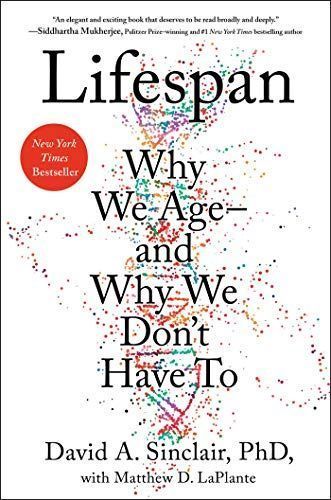
Lifespan Why We Age—and Why We Don't Have To
A NEW YORK TIMES BESTSELLER A paradigm-shifting book from an acclaimed Harvard Medical School scientist and one of Time’s most influential people. It’s a seemingly undeniable truth that aging is inevitable. But what if everything we’ve been taught to believe about aging is wrong? What if we could choose our lifespan? In this groundbreaking book, Dr. David Sinclair, leading world authority on genetics and longevity, reveals a bold new theory for why we age. As he writes: “Aging is a disease, and that disease is treatable.” This eye-opening and provocative work takes us to the frontlines of research that is pushing the boundaries on our perceived scientific limitations, revealing incredible breakthroughs—many from Dr. David Sinclair’s own lab at Harvard—that demonstrate how we can slow down, or even reverse, aging. The key is activating newly discovered vitality genes, the descendants of an ancient genetic survival circuit that is both the cause of aging and the key to reversing it. Recent experiments in genetic reprogramming suggest that in the near future we may not just be able to feel younger, but actually become younger. Through a page-turning narrative, Dr. Sinclair invites you into the process of scientific discovery and reveals the emerging technologies and simple lifestyle changes—such as intermittent fasting, cold exposure, exercising with the right intensity, and eating less meat—that have been shown to help us live younger and healthier for longer. At once a roadmap for taking charge of our own health destiny and a bold new vision for the future of humankind, Lifespan will forever change the way we think about why we age and what we can do about it.
Reviews
matej yangwao@yangwao
Bilge Ince@bilge
Tuago@iagomr
Simao Freitas@simao
Catherine Matheson@catherine_reads
Udit Desai@uydesai
Lukas Gräf@lukasg
Dani C@danisweetea
Emily Wood@emwood95
Vivian Lin@vivianlin
Richu A Kuttikattu@richuak
Rob@robcesq
Alex Kayaian@alexi
Sasha Lukavchenko@sashalook
Róbert Istók@robertistok
Keven Wang@kevenwang
Ben Roberts@benjammin
Michał Paczków@paczkow
Tegan Bell@teganbell
Mounir Bashour@bashour
Tomáš Baránek@tombarys
Paul McCarthy@mccarths
Bilal Catakoglu@bilcat
Bryce Thornton@brycethornton
Highlights
Simon Sylvest@simonsylvest
Page 192